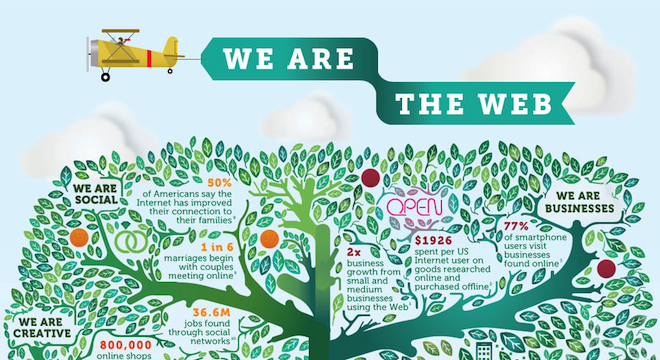Google wants to know what you think of the Internet, and just not in its typical abstract way of mining your search data and other Web behaviors.
On Monday, Google quietly launched a new initiative, “Start something,” asking users to complete the following sentence: “The Internet is the power to ____,” and post their answers on the social network of their choice under the hashtag #OurWeb.
Google also posted a large infographic of a tree showing the growth of the Internet from its founding in 1969 to today, highlighting the millions of jobs that the technology has created along the way.
“This is just the first step in building a conversation around the future of the Internet,” Google wrote of the new campaign in an email to some users and in a statement on its “Take Action,” website, which launched in January specifically to encourage users to sign a petition against two controversial anti-online piracy bills that were moving through Congress at the time, the Stop Online Piracy Act (SOPA) and the PROTECT IP Act (PIPA).
Both bills would have forced U.S. websites to cut off all ties with foreign webpages accused of piracy by U.S. copyright holders, which critics feared would lead to the shutdown of large parts of websites that rely on user-posted content, such as YouTube and Reddit.
Thanks to the mass protest of millions of Web users and thousands of popular websites including Google, Wikipedia and Reddit — which encouraged users to contact their representatives — support for the bills in Congress quickly eroded and further action on them was postponed indefinitely by Congressional leaders.
Although Google was a latecomer to the protests and didn’t participate to the extent that other websites did, only altering part of its U.S. homepage in protest of the bills, Google afterward touted the fact that it managed to get 7 million users to sign its anti-SOPA/PIPA petition.
For three months, it seemed, Web users had won a decisive political skirmish.
But now, other advocacy organizations that led the fight against the bills are on high alert, concerned that Congress may yet attempt to revive SOPA or PIPA, or introduce new legislation.
Many original opponents of the bills have also moved against a new piece of legislation called the The Cyber Intelligence Sharing and Protection Act of 2011 or CISPA, which includes similarly broad language, although its aims are quite different, ostensibly geared toward fighting hackers and cyber attacks, rather than piracy.
Google maintains that its new campaign is unrelated to any specific legislation or political positioning. The timing of this effort with the renewed efforts of anti-SOPA activists was purely coincidental, a Google spokesperson told TPM.
“What we basically saw with the SOPA and PIPA fight was an enormous group of people interested in policy issues,” the Google spokesperson said, “It’s been three months, so we wanted to touch base with those people and ask them what issues are important to them.”
Hence the effort encouraging users to share what the Web means to them. Google’s spokesperson said that of the 7 million plus users that signed its petition to protest SOPA and PIPA in January, another “couple million,” asked to receive email updates from Google about Internet legislation and other Web policy matters. It was these people that Google contacted initially on Monday to begin the #OurWeb campaign.
Editor’s note: This article originally incorrectly attributed a statement to a Google spokesperson that should not have been. The sentence has been removed. We sincerely regret the error.






